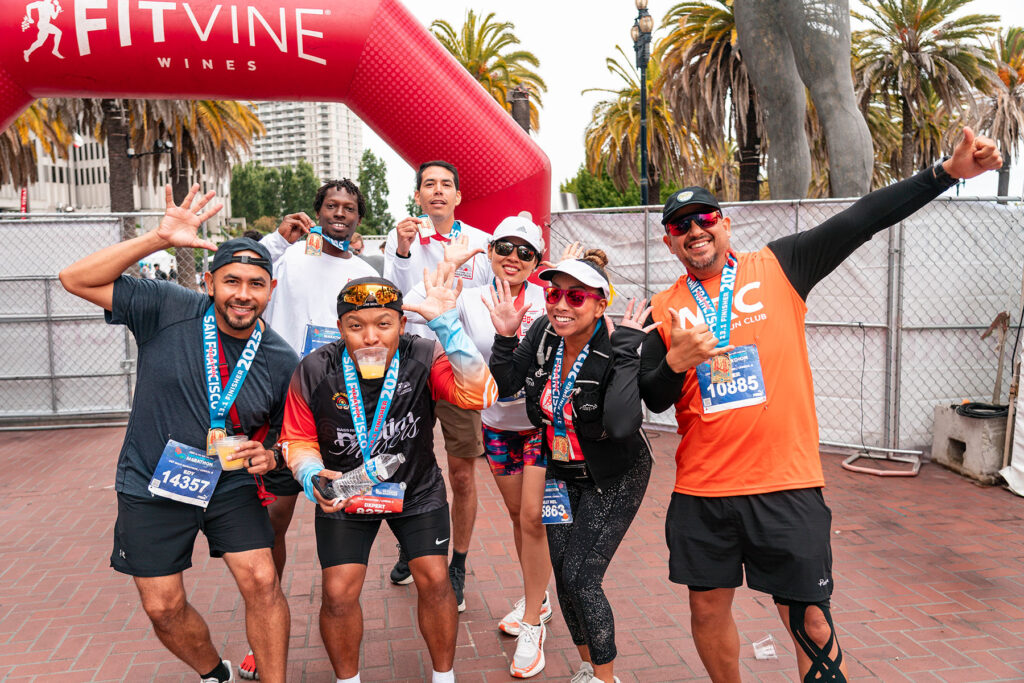Enjoy Your Post-Race High, Deal with Post-Race Blues, & Learn All About Post-Race Recovery!
You’re nearing the finish line. Your body is exhausted but you’ve still got that one last drop of energy that’ll help you finish strong. There’s the arch. And, suddenly, after months of training, you’re done. There’s a medal around your neck and a banana in your hand. Your body’s exhausted, but your mind’s soaring. That’s the start of your post-race journey—a journey from that sweet post-race high to those dreaded post-race blues. And don’t forget about that much-needed TLC; your body and mind deserve some proper recovery!
- The science behind that amazing post-race high (and why you feel like you can conquer the world)
- Real talk about post-race blues—yeah, it’s totally normal to feel down after your big achievement
- Practical strategies to bounce back both physically and mentally
- Expert tips for a complete recovery that goes beyond ice baths and protein shakes
Whether you’re a first-time marathoner or a seasoned runner, understanding these post-race phases is crucial for your recovery journey. Let’s dive into the wild ride of emotions and physical changes that follow your epic achievement—and learn how to navigate them like a pro.

Written & edited by Pavlína Marek
1. Embrace the Euphoria: The Post-Race High
You’ve just crossed that finish line, arms raised high, and boom! Your body has just become a natural pharmacy of feel-good chemicals.
Your brain goes into celebration mode, releasing a cocktail of powerful neurotransmitters:
- Dopamine – Your body’s natural reward system kicks in, flooding you with feelings of accomplishment
- Endorphins – These natural painkillers help create that famous “runner’s high”
- Serotonin – Hello happiness! This mood-boosting chemical adds to your euphoric state
The post-race high hits different for every runner. Some describe it as floating on clouds, while others feel like they could conquer Mount Everest right after their marathon!

During this “high on life” phase, you might experience:
- Uncontrollable smiling (yes, even through the muscle soreness!)
- A surge of mental strength and confidence
- Heightened sense of accomplishment
- Intense motivation for future goals
- Feeling physically invincible (despite barely being able to walk down stairs!)
This post-race euphoria serves a bigger purpose in an athlete’s journey. It reinforces positive associations with challenging physical achievements and helps create lasting memories of success. These powerful emotional experiences often become the fuel that drives athletes to sign up for their next race, sometimes before they’ve even showered after their current one!
2. Navigate the Lows: Understand Those Post-Race Blues
You’ve crossed the finish line, celebrated your achievement, and ridden the wave of euphoria. And then—boom. You’re hit with an unexpected emotional crash. Welcome to post-race blues, the lesser-discussed reality of endurance racing.
- Empty or void inside
- Unmotivated to train
- Disconnected from your usual routine
- Questioning your identity as a runner
- Experiencing mood swings
Your body and brain are going through significant changes after a big race. Here’s what’s happening behind the scenes:
The good news? Post-marathon blues typically last anywhere from a few days to a few weeks. Your emotional state will stabilize as your body recovers and your mind adjusts to post-race life.
- Give yourself permission to feel down
- Stay connected with your running community
- Practice self-care activities, rest, and recover
- Keep a mood journal & reflect on your race and training
- Set small, achievable goals
- Try light exercise or yoga
- Get adequate sleep
Remember: vulnerability after a big race is completely normal. Your body and mind need time to process the massive achievement you’ve just accomplished. The post-race blues aren’t a sign of weakness—they’re a natural part of your journey as an endurance runner.
3. The Importance of Post-Race Recovery: Go Beyond Physical Healing
Your post-race recovery journey needs both your body and mind to heal. Think of it as a full-system reboot. Would you try to fix your phone’s software glitches only by buying a new phone case?
A holistic recovery approach takes care of both physical and mental health. Pay attention to yourself; your body might be ready to hit the pavement again, but your mind could still need time to process the experience—or vice versa.
When to Seek Professional Support:
- Persistent feelings of emptiness or sadness
- Difficulty sleeping or eating
- Loss of interest in activities you usually enjoy
- Physical pain that doesn’t improve with rest
Sports psychologists and physical therapists can offer specialized guidance for your recovery journey. They understand the unique challenges runners face and can provide targeted strategies for both physical and mental healing.
Remember: Recovery isn’t just about getting back to running; it’s about emerging stronger and more resilient. Give yourself permission to take the time you need, and trust that this period of rest and reflection will make you a better athlete in the long run.
Let’s Recap Your Journey Through the Post-Race Experience
Your post-race journey is uniquely yours; embrace it! The rollercoaster of emotions from post-race high to potential blues is a natural part of the recovery process and your athletic experience.
How to deal with it? Remember to:
- Celebrate your achievement because you’ve accomplished something incredible
- Take time to rest and recover as both your body and mind deserve it
- Stay connected with your running buddies who understand this journey
- Listen to your body’s signals for when you’re ready to hit the trails again
Going through the post-race process might feel challenging, but it’s an opportunity for growth. Your next starting line will be there when you’re ready—physically and mentally. For now, be proud, rest up, and let your achievement sink in. You’ve earned it!


